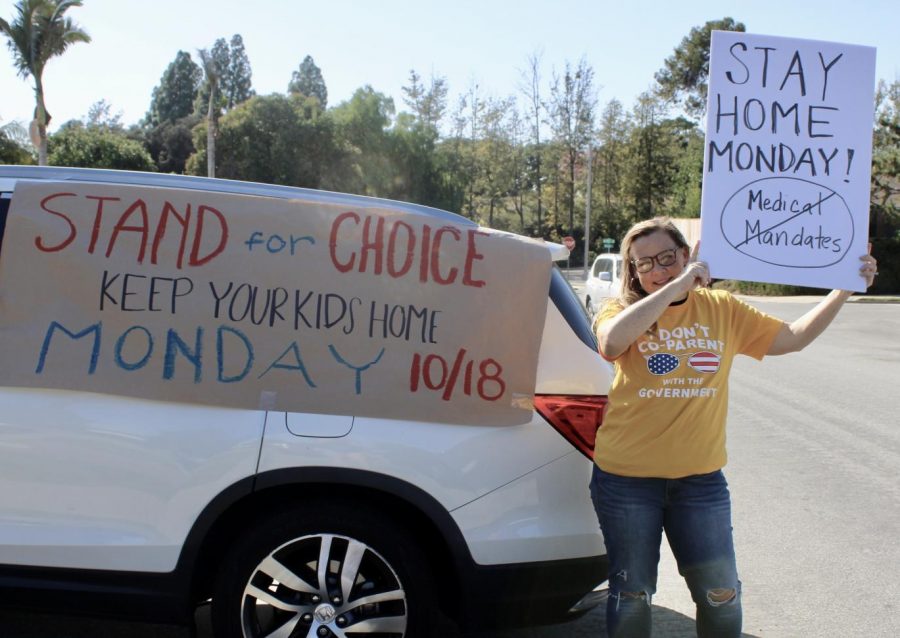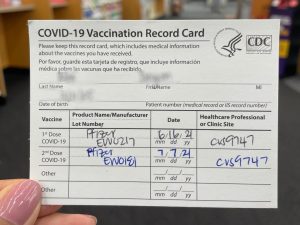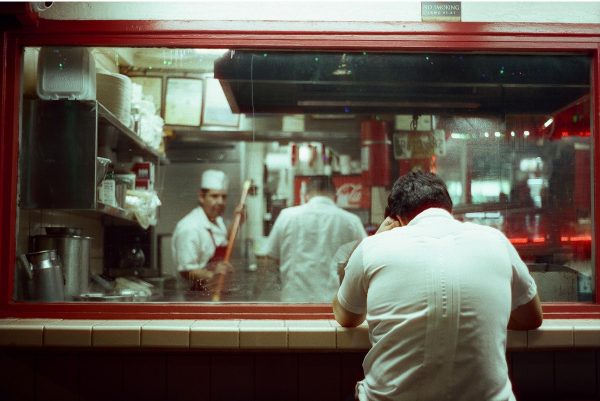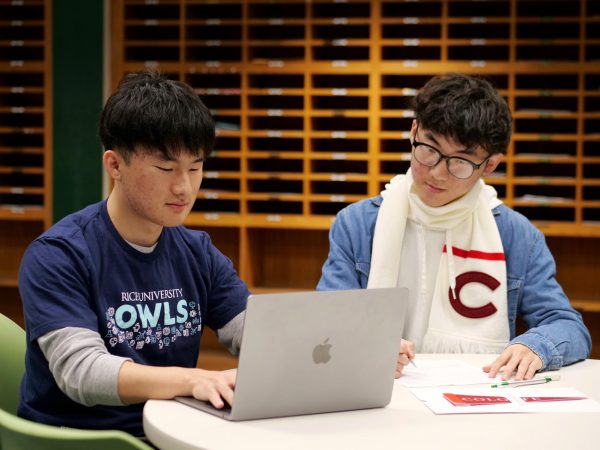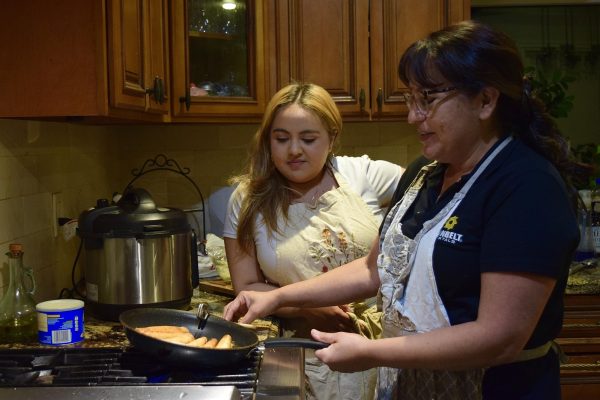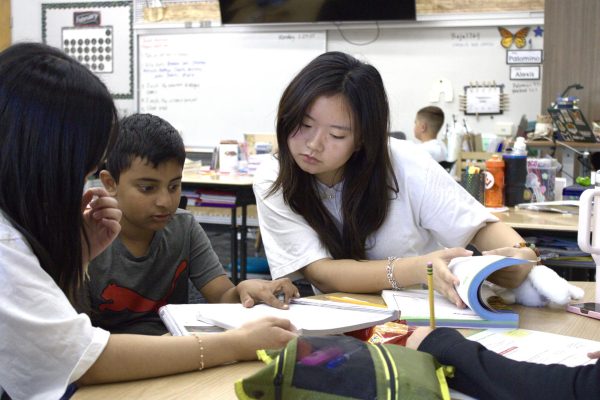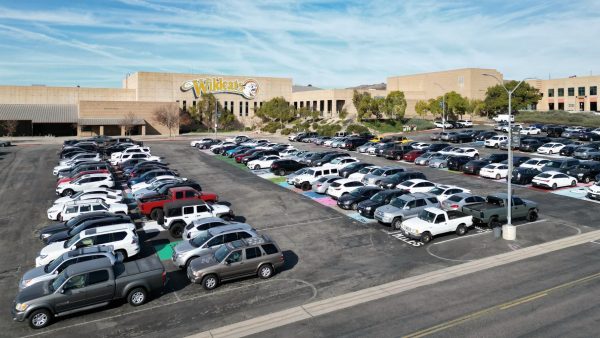Students Divided on Newsom’s Vaccine Mandate
An adult protests the COVID-19 vaccine mandate on Oct. 16. Flyers and social media posts encouraging a district-wide “sit-in” to protest Gov. Gavin Newson’s vaccination mandate circulated around the Brea community after Newson’s Oct. 1 press release.
A COVID-19 vaccine mandate was announced by California Gov. Gavin Newsom on Oct. 1, creating division on Wildcat Way between students who support the mandate, and those who oppose it.
California was the first U.S. state to mandate masks in schools and require COVID-19 vaccinations (or weekly tests) for school staff. Four months later, on Oct. 1, California again became the first in the nation, this time in announcing a vaccine mandate for grades Kindergarten to 12. The mandate will require all students in California to be vaccinated against COVID-19.
Newsom explained his rationale for the mandate in a press release on Oct. 1: “The state already requires that students are vaccinated against viruses that cause measles, mumps, rubella — there’s no reason why we wouldn’t do the same for COVID-19.”
Following the approval of the Pfizer vaccine for five- to 11-year-olds on Oct. 26, the vaccine mandate will be implemented on either Jan.1, 2022 or July 1, 2022. (The exact date has yet to be revealed by Newsom’s office, and there have not been any updates to the Oct. 1 press release, which states: “The requirement will take effect at the start of the term following full approval of that grade span, to be defined as January 1st or July 1st, whichever comes first. Based on current information, the requirement is expected to apply to grades 7-12 starting on July 1, 2022.”)
Those who choose not to get the COVID-19 vaccine for medical or religious reasons will be exempted from this mandate, but those who are not getting it for other reasons will be required to enroll in independent study programs.
News of Newsom’s mandate has sparked debate amongst BOHS students.
An Oct. 5 Wildcat-conducted survey on Instagram that asked “Do you agree or disagree with the COVID-19 vaccine mandate?” generated 172 responses, of which, 44.2% “disagree” with the mandate, and 55.8% “agree” with it.
For students who disagreed, the chief complaint was how the requirement will infringe on students’ constitutional rights.
“It no longer is a choice whether I want to get vaccinated or not. I am being forced to get it in order to go to school and participate in extracurricular activities,” Mason Fisher, junior, said.
Drew Jensen, junior, thinks the vaccine “should be strongly recommended,” but he also believes that students should still have the right to choose if they want it or not.
Antonio Alas, senior, believes that allowing the government to “force something on people’s bodies opens the door for more rights they can take.”
However, for Madison Smith, sophomore, there is no valid reason for “students that don’t get vaccinated to be told they aren’t allowed to go to school, or stop playing the sport they’ve been playing for their entire life.”
Luke Muntean, sophomore, thinks that it’s not “someone else’s decision to put something in our bodies if we don’t agree with it.”
But for some students who agree with the mandate, requiring the COVID-19 vaccine is not any different from the immunization requirements schools already mandate in California.
“It’s not too different from the already-mandatory immunizations we have to get for school, like HPV,” Jacob Cooper, senior, said. “The only thing that’s different with this one is that the COVID-19 vaccine has been super-politicized and there’s a huge division because of it; when in reality it’s just a vaccine like the other ones,” he added.
Vaccine requirements are “completely normal” and the COVID-19 vaccine “is not any different” according to Joseph Gonzalez, senior. “By requiring the COVID-19 vaccination, [BOHS] will protect students and their families from the danger of the disease.”
Some students oppose the mandate due to their uncertainty about the vaccine’s safety, and its potential side effects.
Allison Newton, junior, said that “since the vaccine is also still too new,” she doesn’t know “how it will affect the students in the long run.”
Cullen Doyle, freshman, believes that students should not be required to “put something in [their] bodies that was made in less than a year.”
(The speed at which the COVID-19 vaccine was developed has induced some skepticism. However, the coronavirus was already familiar to scientists, who studied severe acute respiratory syndrome [SARS] epidemic in 2002, and Middle East Respiratory syndrome [MERS] in 2012. “Existing data on the structure, genome, and life cycle of this type of virus,” was available when COVID-19 struck in 2019, according to Medical News Today.)
Other students feel that the mandate will help reduce the spread of COVID-19, and will bring a measure of normalcy to attending school.
“It could help stop the spread of COVID-19 in schools,” Samuel Dunbar, junior, said. “Classes and sports [can] maintain normal schedules and it will also help prevent full school shutdowns.”
Lauren Ahn, sophomore, describes the vaccine as a “perfectly safe and effective vaccine” and believes it’s “one of the biggest things you can do to prevent it from spreading further.”
Nyah Maldonado, junior, said COVID-19 vaccines will take BOHS “a step closer to coming back to a normal school, with no masks, and school going back to how it was when none of [COVID-19] happened.”
Despite the possible return to normalcy, students like Liam Bryant, junior, are already set on choosing independent study when the mandate is incorporated in Brea Olinda Unified School District. Bryant said, “I will leave the school if [the state] mandates it.”
If Austin Garabedian, junior, is forced to choose between the COVID-19 vaccine or take independent study, he said, “I can assure you that I will not be returning to school.”
Bryant and Garabedian aren’t alone in their opposition to Newsom’s mandate. On Oct. 18, a statewide “sit-out” was held, in which students stayed home (with an unexcused absence) to protest the proposed vaccine mandate. At BOHS that day, there was an 460% increase in absences with 235 absences on average, per period, on Oct. 18, versus an average of 42 the next day.
Senior Georgia Duk, one of the students who participated in this sit-out, said, “If some feel more comfortable getting vaccinated and feeling protected, that’s fine, I respect everyone’s opinions. But when it comes to mandating a vaccine so students can attend school, I think that’s not right”
Gabrielle Hofmann, junior, who support the mandate, believes that “it will decrease any form of fear [of] COVID-19 spreading from person to person” and “the school will be a better and safer environment for students to attend.”
Harleen Bajwa, sophomore, agrees that the mandate would allow other students to “worry less about the health of students, and others wouldn’t have to go to school in fear [of] thinking they would get sick.”
With the COVID-19 vaccine approved by the FDA for children five-years old and above, California is another step closer to requiring students statewide to get the COVID-19 vaccine, which may ignite further division in the Brea community.
Your donation supports the student journalists at Brea Olinda High School! The contribution will help us purchase equipment, upgrade technology, and cover our annual website hosting costs.
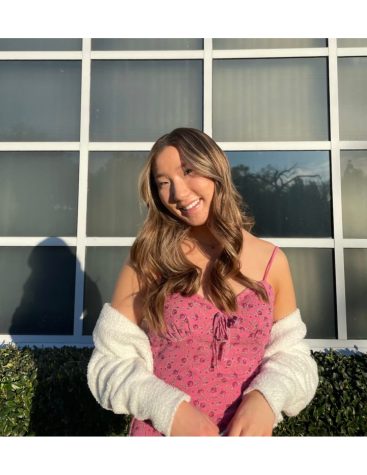
Karis Choi, junior, joined the Wildcat newspaper at the beginning of her sophomore year starting off as a photographer and staff writer and transitioning...
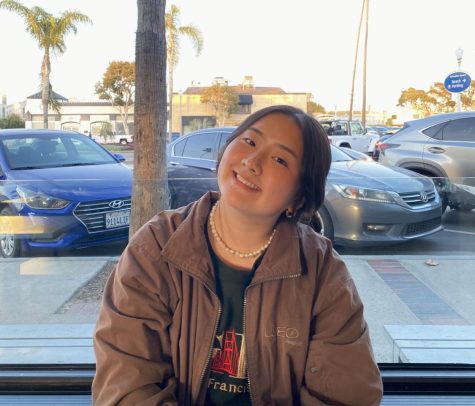
Jasmine Youn is a Wildcat Feature Editor, born and raised from the Bay Area in California. She likes to spend most of her time crocheting, listening to...
Isabella Abalos, senior, is ecstatic about returning for her third year as one of the Photo Managers for the Wildcat. She enjoys going to the...



